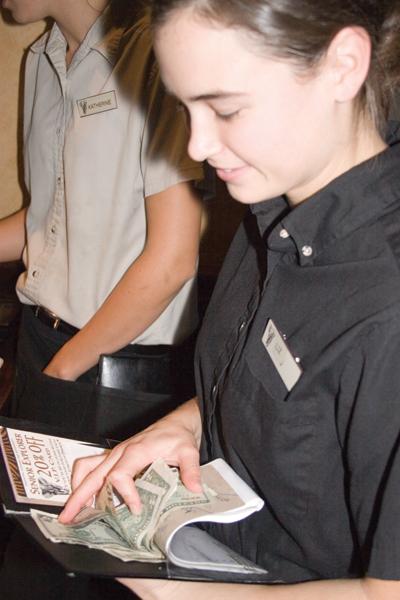A working education

Full-time criminal justice major Elizabeth Crettol works four days a week at the Elephant Bar.:
October 29, 2007
There have been several changes over the past decade that have affected the lives of students and their ability to earn a college degree in a timely manner, if at all. While most can be traced to common issues such as the general cost of living, it is unclear how much others, including longer working hours and more homework, are affecting education.
One of the most significant changes affecting college students today is the sharp rise in tuition fees.
According to a 2007 MSNBC survey, “College costs have easily surpassed the cost of inflation. The average bill for attending a four-year public college rose 52 percent from 2001 to 2007.”
Many California State University students have felt the sting of gradual fee increases at all 23 CSU campuses, including Sac State.
“It (has) been really tough on my bank account,” said sophomore communication studies major Julie Edwards.
According to 2002 CasperWeb, in 2002 the cost of tuition was $282 per unit. Tuition currently stands at $339 per unit.
Another essential “investment” students make is the purchase of textbooks.
Some professors have chosen to go with smaller, more simplified textbooks or workbooks to help cut costs for students.
Communications studies professor Edith LeFebvre said she ordered the “bare-bones version” of most of her textbooks to help her students save a few bucks.
“Students are subject to an unfair situation,” LeFebvre said. “Textbooks have tripled in cost over the last 10 to 12 years.”
According to a survey conducted by the Office of Institutional Research, most students pay for their college education with “part-time jobs or family assistance.”
Over time, cost increases and longer work hours can have a trickle-down effect on other areas of students’ lives.
“Working too much while you’re in school isn’t just stressful,” said Melissa Corn, junior public relations major. “(Work) makes me feel like I’m missing out on my life with my friends and family. Plus, when is there ever time for homework?”
LeFebvre said there’s more to student stress than just long working hours.
“It’s more than (students being) overworked,” LeFebvre said. “It’s time…too many units. It begins to cost too much…students have to get out of here. It’s like a cat chasing its tail.”
She described it as a “vicious cycle” and said students can never get ahead because they “try to get done as early as possible because the price of education is increasing…so they take on more units per semester…then (at the same time) they work more to finance their education.”
A number of students have expressed frustration about being overworked because they feel they are capable of succeeding in school, but don’t have the time or energy to do so.
“Right now, I work full time to support myself and I have two night classes,” Corn said. “Last year I was working full time and took too many units. I got a few bad grades and then ended up disqualified from school…it was a fight to get reinstated. This semester, when I was in-between jobs, I got A’s on all of my tests and assignments…I was doing really well.”
If students had time to be students, their intellectual abilities and talents could be expressed, and maybe their true potential reached, LeFebvre said.
While students always had to balance school, work and other activities, many students said work is becoming a dominant factor in their lives.
“I work 32 hours a week, and yes, I am extremely stressed,” said Dimana Karumora, junior criminal justice major. “Especially before exams….I have six classes and midterms are coming up.”
According to the OIR’s spring 2007 Graduating Students Survey, Sac State students in their graduating year work an average of 20 hours per week. This number has doubled since 2003 when a majority of graduating seniors said they worked “an average of 10 hours per week.”
According to the same survey, the amount of time spent “in course work activity” has also increased from nine hours a week in 2003 to 14 hours a week.
Kate Jones can be reached at [email protected].




























































































































